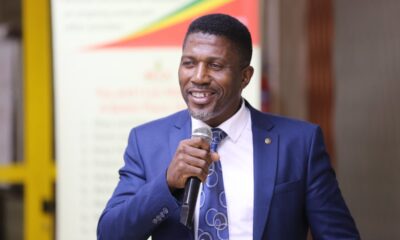News
Tanzanian Authorities Pressed to Produce Ugandan Journalist and Kenyan Activist in Court
Lawyers representing Ugandan journalist and human rights award winner Agather Atuhaire and Kenyan activist Boniface Mwangi have filed an urgent habeas corpus application in Tanzania, demanding their immediate production in court. The duo was arrested earlier this week in Dar es Salaam while attempting to observe the trial of Tanzanian opposition leader Tundu Lissu.
Despite an earlier statement from Tanzania’s Law Society President, Boniface Mwabukusi, indicating their release, Atuhaire and Mwangi have not returned to their respective countries, prompting growing concern over their whereabouts and well-being. Their last known public appearance was on May 19, 2025.
Lead lawyer Jebra Kambole and his team have formally written to Tanzania’s Inspector General of Police, urging the release of Atuhaire and Mwangi “in the interest of justice.” The application, dated May 21, 2025, emphasizes the “extreme urgency” of the matter.
The petition states that Atuhaire and Mwangi have been in police custody since May 20, 2025, when authorities reportedly promised to deport them via Mwalimu Julius Nyerere Airport. “Ever since, the whereabouts, mental and physical conditions of the applicants remain unknown and they have been held incommunicado,” the application asserts.
Copies of the application have been sent to a wide range of Tanzanian legal and law enforcement officials, including the Dar es Salaam Zonal Police Commander, Dar es Salaam Crime Officer, the Officer Commanding Criminal Investigations, Officer Commanding Central Police Dar es Salaam, the Director of Public Prosecutions, and the Attorney General of Tanzania.
The petition underscores the critical need for judicial intervention, not only for the protection of the individuals but also for “Tanzania’s national image and involved countries.”
Agather Atuhaire, recipient of the EU Human Rights Award, was initially arrested alongside Kenya’s former Justice Minister, Martha Karua. Karua was subsequently deported from Tanzania. Speaking on an X Space on Wednesday evening, Karua, who was in Uganda to attend the trial of Dr. Kizza Besigye, expressed solidarity with Atuhaire and Mwangi.
Karua called for peaceful protests and engagement with relevant embassies, urging East Africans to “do all we can” for the release of the two and for broader reforms within the region. She also implored the Kenyan government not to “be let off the hook” regarding the situation.
“We are trying to reach CCM higher echelons to tell them that they are doing themselves a greater disservice by continuing holding people incommunicado when they have not committed any offence,” Karua revealed, referring to Tanzania’s ruling Chama Cha Mapinduzi party.
The arrests come amidst a stern warning from Tanzanian President Samia Suluhu Hassan, who stated on Monday that she would not tolerate activists from Kenya and Uganda “meddling” in her country’s affairs or causing “chaos.” “If they have been contained in their country, let them not come here to meddle. Let’s not give them a chance. They have already created chaos in their own country,” President Hassan cautioned.
Activists in Uganda, Kenya, and Tanzania are reportedly planning peaceful protests at the embassies of Tanzania, Uganda, and Kenya to press for the release or deportation of their colleagues.
The detention of Atuhaire and Mwangi is linked to their interest in the ongoing trial of Tanzanian opposition leader Tundu Lissu. Lissu was arrested in April after organizing a rally under the banner “No Reforms, No Election,” advocating for sweeping electoral changes. He argues that Tanzania’s current laws hinder free and fair elections, an assertion denied by the government. Lissu’s Chadema party has been barred from contesting the October poll after refusing to sign a code of conduct required by the electoral commission.
The African Court on Human and Peoples’ Rights, based in Banjul, serves as a continental body ensuring the protection of human and peoples’ rights across Africa, complementing the African Commission on Human and Peoples’ Rights. The current situation is likely to attract further attention from regional human rights bodies.
Comments























